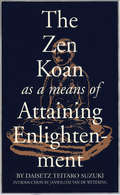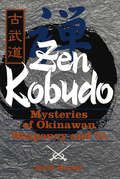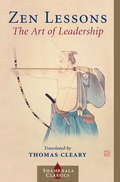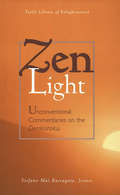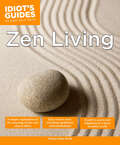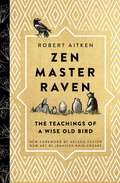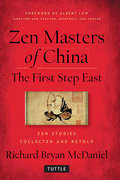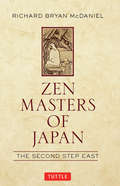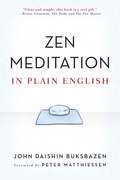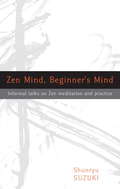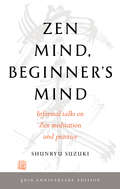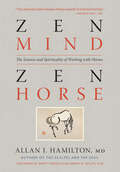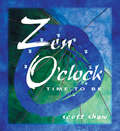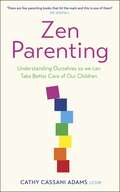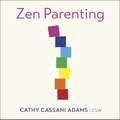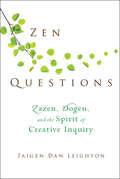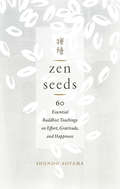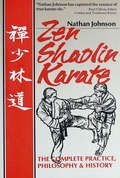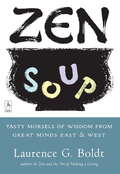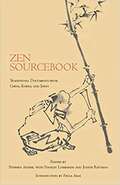- Table View
- List View
Zen Koan as a Means of Attaining Enlightenment
by Daisetz Teitaro SuzukiZen Koan as a Means of Attaining Enlightenment Presents the history and application of the koan exercise--the means for realizing enlightenment--with depth and clarity.<P><P>The koan system has effected a special development in Zen Buddhism, and is a unique contribution to the history of religious consciousness. When the importance of the koan is understood, it may be said that more than half of Zen is understood.
Zen Kobudo
by Mark BishopKobudo, the famous armed Okinawan fighting art that utilizes common farming implements in combat, and Te, the ancient Okinawan art of armed and unarmed combat, are two of the world's most widely practiced yet least-understood martial arts. This book studies the individual Kobudo and Te systems as they are practiced in Okinawa today and discusses their various histories and the lives of the masters who have most influenced them. Spiritualism in the Okinawan arts is also covered in detail, as the author masterfully describes the mix of Zen and native beliefs that are vital to these arts, yet a component that has been all but ignored by previous researchers. In addition, this is the first work to discuss anthropological theories on Okinawa and the development of fighting arts there from the Stone Age. This complete and wide-ranging study of Okinawan weaponry, history, and training is the ultimate guide to these important fighting arts.
Zen Kobudo
by Mark BishopKobudo, the famous armed Okinawan fighting art that utilizes common farming implements in combat, and Te, the ancient Okinawan art of armed and unarmed combat, are two of the world's most widely practiced yet least-understood martial arts. This book studies the individual Kobudo and Te systems as they are practiced in Okinawa today and discusses their various histories and the lives of the masters who have most influenced them. Spiritualism in the Okinawan arts is also covered in detail, as the author masterfully describes the mix of Zen and native beliefs that are vital to these arts, yet a component that has been all but ignored by previous researchers. In addition, this is the first work to discuss anthropological theories on Okinawa and the development of fighting arts there from the Stone Age. This complete and wide-ranging study of Okinawan weaponry, history, and training is the ultimate guide to these important fighting arts.
Zen Lessons: The Art of Leadership
by Thomas ClearyThis guide to enlightened conduct for people in positions of authority is based on the teachings of several great Chinese Zen masters. Drawing on private records, letters, and long-lost documents of the Song dynasty (tenth to thirteenth centuries), Zen Lessons consists of short excerpts written in language that is accessible to the reader without any background in Eastern philosophy. This book serves as a guide to recognizing the qualities of a genuine Zen teacher; it also serves as a study of the character and conduct necessary for the mastery of any position of power and authority--whether religious, social, political, or organizational.
Zen Light
by Stefano Mui BarragatoThe Denkoroku, or "Record of Transmitting the Light," contains the enlightenment stories of the earliest Zen ancestors. In Zen Ught, the author comments on this Buddhist classic, which he studied as part of his own advanced Zen training. Sensei Barragato brings the varied experiences of his life and his studies in Catholicism and Quaker practice to the teachings of Zen Buddhism, making these commentaries at once off-beat, refreshing, and revealing. He touches on the major issues that affect our lives, making thisbook of interest to both the beginning as well as the advanced student of Zen.
Zen Light
by Stefano Mui BarragatoThe Denkoroku, or "Record of Transmitting the Light," contains the enlightenment stories of the earliest Zen ancestors. In Zen Ught, the author comments on this Buddhist classic, which he studied as part of his own advanced Zen training. Sensei Barragato brings the varied experiences of his life and his studies in Catholicism and Quaker practice to the teachings of Zen Buddhism, making these commentaries at once off-beat, refreshing, and revealing. He touches on the major issues that affect our lives, making thisbook of interest to both the beginning as well as the advanced student of Zen.
Zen Living: A Simple Explanation of the Meaning of Zen and What It Offers (Idiot's Guides)
by Domyo Sater BurkIn today's fast-paced, technology-laden society, it's easy to become overwhelmed. People seek calm and simplicity, but have a hard time realizing a "Zen" life. Monk and sensei Domyo Sater Burk illustrates how to get started on the path to peace and enlightenment, regardless of cultural or religious affiliation. You'll learn the foundation and essential teachings of Zen practice, how to engage in meditation and mindfulness, and how to live daily within a Zen moral code.
Zen Master Raven: The Teachings of a Wise Old Bird
by Robert Aitken Nelson Foster Jennifer Rain CrosbyA uniquely playful and incisive collection of Zen teaching stories from a beloved American master.A Modern Classic. In the tradition of the great koan collections and the records of ancient masters, Robert Aitken distills a lifetime of teaching down to its essence. Intriguing and deceptively simple, Zen Master Raven is a brilliant encapsulation of Zen in over a hundred koan-like encounters alongside many charming illustrations. Featuring curious beginners like Mallard and Mole and profound teachers like Brown Bear, Moose Roshi, and Zen Master Raven himself, this classic of contemporary Zen and will inspire seekers for generations to come.
Zen Masters of China
by Albert Low Richard Bryan Mcdaniel[Zen Masters of China presents more than 300 traditional Zen stories and koans, far more than any other collection. Retelling them in their proper place in Zen's historical journey, it also tells a larger story: how, in taking the first step east from India to China, Buddhism began to be Zen.]The stories of Zen are unlike any other writing, religious or otherwise. Used for centuries by Zen teachers as aids to bring about or deepen the experience of awakening, they have a freshness that goes beyond religious practice and a mystery and authenticity that appeal to a wide range of readers.[Placed in chronological order, these stories tell the story of Zen itself, how it traveled from West to East but also how it was transformed in that journey, from an Indian practice to something different in China (Ch'an) and then more different still in Japan (Zen). The fact that its transmission was so human, from teacher to student in a long chain from West to East, meant that the cultures it passed through inevitably changed it.Zen Masters of China is first and foremost a collection of mind-bending Zen stories and their wisdom. More than that, without academic pretensions or baggage, it recounts the genealogy of Zen Buddhism in China and, through the stories themselves, illuminates how Zen became what it is today.]
Zen Masters of China
by Albert Low Richard Bryan Mcdaniel[Zen Masters of China presents more than 300 traditional Zen stories and koans, far more than any other collection. Retelling them in their proper place in Zen's historical journey, it also tells a larger story: how, in taking the first step east from India to China, Buddhism began to be Zen.]The stories of Zen are unlike any other writing, religious or otherwise. Used for centuries by Zen teachers as aids to bring about or deepen the experience of awakening, they have a freshness that goes beyond religious practice and a mystery and authenticity that appeal to a wide range of readers.[Placed in chronological order, these stories tell the story of Zen itself, how it traveled from West to East but also how it was transformed in that journey, from an Indian practice to something different in China (Ch'an) and then more different still in Japan (Zen). The fact that its transmission was so human, from teacher to student in a long chain from West to East, meant that the cultures it passed through inevitably changed it.Zen Masters of China is first and foremost a collection of mind-bending Zen stories and their wisdom. More than that, without academic pretensions or baggage, it recounts the genealogy of Zen Buddhism in China and, through the stories themselves, illuminates how Zen became what it is today.]
Zen Masters of China: The First Step East
by Albert Low Richard Bryan Mcdaniel[Zen Masters of China presents more than 300 traditional Zen stories and koans, far more than any other collection. Retelling them in their proper place in Zen's historical journey, it also tells a larger story: how, in taking the first step east from India to China, Buddhism began to be Zen.]The stories of Zen are unlike any other writing, religious or otherwise. Used for centuries by Zen teachers as aids to bring about or deepen the experience of awakening, they have a freshness that goes beyond religious practice and a mystery and authenticity that appeal to a wide range of readers.[Placed in chronological order, these stories tell the story of Zen itself, how it traveled from West to East but also how it was transformed in that journey, from an Indian practice to something different in China (Ch'an) and then more different still in Japan (Zen). The fact that its transmission was so human, from teacher to student in a long chain from West to East, meant that the cultures it passed through inevitably changed it.Zen Masters of China is first and foremost a collection of mind-bending Zen stories and their wisdom. More than that, without academic pretensions or baggage, it recounts the genealogy of Zen Buddhism in China and, through the stories themselves, illuminates how Zen became what it is today.]
Zen Masters of Japan
by Richard Bryan McdanielZen Masters of Japan is the second book in a series that traces Zen's profoundly historic journey as it spread eastward from China and Japan, toward the United States. Following Zen Masters of China, this book concentrates on Zen's significant passage through Japan. More specifically, it describes the lineage of the great teachers, the Pioneers who set out to enlighten an island ready for an inner transformation based on compassionate awareness.While the existing Buddhist establishment in Japan met early Zen pioneers like Dogen and Eisai with fervent resistance, Zen Buddhism ultimately perservered and continued to become further transformed in its passage through Japan. The Japanese culture and Japanese Buddhism practices further deepened and strengthened Zen training by combining it with a variety of esoteric contemplative arts-the arts of poetry, the tea ceremony, calligraphy, and archery. Zen Masters of Japan chronicles this journey, and shows how the new practices soon gained in popularity among all walks of life-from the lowly peasant, offering a hope of reincarnation and a better life; to the Samurai warrior due to its casual approach to death; to the ruling classes, challenging the intelligentsia because of its scholarly roots. A collection of Zen stories, meditation, and their wisdom, Zen Masters of Japan also explores the illusive state of 'No Mind' achieved in Japan that is so fundamental to Zen practices today.
Zen Meditation in Plain English
by Peter Matthiessen John Daishin BuksbazenAn excellent, practical introduction to Zen meditation. Written in a warm and easily accessible style, this book appeals to anyone with an interest in meditation, Zen, or, as is often the case today, a combination of the two. The book emphasizes the importance of receiving good instruction and of finding groups to practice with, yet it lays out the necessary steps to practice Zen meditation on your own. The book includes easily followed exercises to help the reader along. For anyone looking to uncover a clear and insightful path into the philosophy and practice of Zen meditation, this book represents the culmination of that search.
Zen Mind, Beginner's Mind
by Shunryu Suzuki David Chadwick"In the beginner's mind there are many possibilities, but in the expert's there are few." So begins this most beloved of all American Zen books. Seldom has such a small handful of words provided a teaching as rich as has this famous opening line. In a single stroke, the simple sentence cuts through the pervasive tendency students have of getting so close to Zen as to completely miss what it's all about. An instant teaching on the first page. And that's just the beginning. In the forty years since its original publication, Zen Mind, Beginner's Mind has become one of the great modern Zen classics, much beloved, much reread, and much recommended as the best first book to read on Zen. Suzuki Roshi presents the basics--from the details of posture and breathing in zazen to the perception of nonduality--in a way that is not only remarkably clear, but that also resonates with the joy of insight from the first to the last page. It's a book to come back to time and time again as an inspiration to practice, and it is now available to a new generation of seekers in this fortieth anniversary edition, with a new afterword by Shunryu Suzuki's biographer, David Chadwick.
Zen Mind, Beginner's Mind: 50th Anniversary Edition
by Shunryu SuzukiNamed one of the 100 Best Spiritual Books of the Twentieth Century (Spirituality & Practice)A 50th Anniversary edition of the bestselling Zen classic on meditation, maintaining a curious and open mind, and living with simplicity."In the beginner's mind there are many possibilities, but in the expert's there are few."So begins this most beloved of all American Zen books. Seldom has such a small handful of words provided a teaching as rich as has this famous opening line. In a single stroke, the simple sentence cuts through the pervasive tendency students have of getting so close to Zen as to completely miss what it's all about. It is an instant teaching on the first page--and that's just the beginning.In the fifty years since its original publication, Zen Mind, Beginner's Mind has become one of the great modern spiritual classics, much beloved, much reread, and much recommended as the best first book to read on Zen. Suzuki Roshi presents the basics--from the details of posture and breathing in zazen to the perception of nonduality--in a way that is not only remarkably clear, but that also resonates with the joy of insight from the first to the last page.
Zen Mind, Zen Horse: The Science and Spirituality of Working with Horses
by Allan J. Hamilton“Far more than a book about how to care for a horse, though it stands out as one of the best on the subject . . . beautiful” (Susan Richards, author of Chosen by a Horse). This unique guide to horsemanship incorporates Eastern philosophy to describe how horses understand and respond to the flow of vital energy around them, and how they use this energy, called chi, to communicate with their herd, express dominance, and sense predators. Written by the award-winning author of The Scalpel and the Soul, and including forewords by Monty Roberts and Dr. Robert Miller, Zen Mind, Zen Horse shares safe, simple techniques to make you more receptive to your animal’s chi, so you can develop a calm and effective training style that will not only help your horse follow commands, but strengthen the spiritual bond between horse and rider.
Zen O'Clock: Time to Be
by Scott ShawA new way to look at clocks and calendars—and learn to live more peacefully in the present. Imagine being able to step beyond the controlling hands of clocks, calendars, and schedules to discover the mystical process that will give you an entirely new perspective of time. Inside this book are insightful aphorisms that will help you live more peacefully in the present. With each page, Scott Shaw, an expert in meditative consciousness, helps you throw away phrases like &“wasted time&” and &“time constraints&”—and understand the difference between what time is and what we perceive it to be. Imagine, right now, time in your hands!
Zen Parenting: Understanding Ourselves so we can Take Better Care of Our Children
by Cathy Cassani Adams'There are few parenting books that hit the mark and this is one of them!' Dr ShefaliWe can't always plan for what's next - that's been made more and more clear in the past few years. The truth is that life is never predictable, especially for parents. What is possible is an unlimited capacity for compassion and caring - for yourself and your children. As you navigate the uncertainty with openness and humility, you find the clarity, connection, and community that is Zen Parenting. Using the seven chakras, therapist Cathy Cassani Adams discusses parenting issues such as school pressure, self-care, emotional intelligence, anxiety, sexuality and gender, and more, while offering concrete examples and strategies to help you wake up to your life as a parent. Zen Parenting guides you to:- Establish your physical, emotional and mental foundation- Practice creativity and how to access your emotions- Develop your sense of self and allow your kids to do the same- Experience openheartedness, empathy and compassion- Discover genuine and meaningful communication- Explore mindfulness, meditation and your own intuition- Connect to something greater than yourself
Zen Parenting: Understanding Ourselves so we can Take Better Care of Our Children
by Cathy Cassani AdamsAn audiobook that helps parents to pay attention to daily life and the relationships they are creating with their children.We easily fall into the trap of parenting without a real awareness of what we're doing and why we're doing it, invariably using other peoples' ideas and values or outdated child-rearing techniques.A Zen Parent, is not a label or prescriptive way to parent, but a willingness to stay present with what's happening and do the right thing. It's a commitment to an imperfect practice of continual self-awareness so we can show up for our children in an authentic and mindful way. The one thing that can be counted on throughout parenting is change - just when we understand our child's experience or buy the right size clothes, they change and grow. Just when we get comfortable with typical life challenges, the world experiences a global pandemic. Being able to parent and live well requires a willingness to get comfortable with disorder and uncertainty, and even more of a willingness to be introspective and creative to once again find reorder.Structured through the 7 bodily chakras, which are used as a framework for human existence, this book is for parents who want to raise their children in a more self-aware and mindful way, to expand their thinking about who they are and what they want to share with their kids. It's a self-study and reminder to pay attention to daily life and the relationships they are creating with their children. And it's an opportunity to live what they want their kids to learn, to show up as themselves so their kids know they can do the same.(P) 2022 Hachette Audio
Zen Questions
by Taigen Dan LeightonWhether speaking of student or master, Zen hinges on the question. Zen practice does not necessarily focus on the answers, but on finding a space in which we may sustain uncertainty and remain present and upright in the middle of investigations. Zen Questions begins by exploring "The World of Zazen,"--the foundational practice of the Zen school--presenting it as an attitude of sustained inquiry that offers us an entryway into true repose and joy. From there, Leighton draws deeply on his own experience as a Zen scholar and teacher to invite us into the creativity of Zen awareness and practice. He explores the poetic mind of Dogen with the poetry of Rumi, Mary Oliver, Gary Snyder, and even "the American Dharma Bard" Bob Dylan. What's more, Leighton uncovers surprising resonances between the writings of America's Founding Fathers--including Thomas Jefferson and Ben Franklin--and the liberating ideals at the heart of Zen.
Zen Seeds: 60 Essential buddhist Teachings on Effort, Gratitude, and Happiness
by Shundo AoyamaFrom a living treasure of Japanese Zen, an inspiring collection of teachings about the power of Buddhist practice to help you transform suffering and touch the marrow of your life.In this sparkling collection of teachings, Japanese Zen master Shundo Aoyama Roshi offers an entry to the authentic practice of Zen Buddhism. Or, rather, she offers a myriad of entries—for Zen Seeds, as its title suggests, is comprised of brief chapters meant to plant seeds of wisdom and compassion in readers. Ranging from classical Zen sources, such as the teachings of Dogen and the encounter stories of the koans, to anecdotes from Aoyama’s fascinating life and from those of her many students, the book paints a profoundly compelling portrait of the transformative possibilities of Zen. A pioneering female leader in the Soto Zen school, Aoyama Roshi demonstrates the power of practice for anyone seeking to lead a life of greater conviction and spiritual nourishment.
Zen Shaolin Karate
by Nathan JohnsonIn Zen Shaolin Karate, Johnson explains and illustrates in precise detail every subtle movement of two of karate's most common kata, and provides historical testimony for his explanations by integrating his findings with Zen philosophy. The author's unique interpretations of the Nai Fuan Chin and Saam Chin kata will destroy the barriers separating karate, kung fu, and aikido, and will revolutionize how kata are applied in all karate styles.
Zen Shaolin Karate
by Nathan JohnsonIn Zen Shaolin Karate, Johnson explains and illustrates in precise detail every subtle movement of two of karate's most common kata, and provides historical testimony for his explanations by integrating his findings with Zen philosophy. The author's unique interpretations of the Nai Fuan Chin and Saam Chin kata will destroy the barriers separating karate, kung fu, and aikido, and will revolutionize how kata are applied in all karate styles.
Zen Soup (Compass)
by Laurence G. BoldtIf, as the I Ching says, thoughts are spirits, then this collection of highly distilled thoughts from history?s greatest philosophers and religious figures will certainly put you in good spirits. <P><P>Laurence Boldt has long made a practice of applying Zen principles to everyday life. Here he applies wisdom from all corners of the world to twenty-five aspects, or qualities, associated with the Zen tradition. The result is a soup of the most hearty and wholesome kind, well-seasoned with age, and filled with delicious surprises: ?Where your talents and the needs of the world cross, thence lies your vocation.? --Aristotle ?A man with outward courage dares to die: A man with inward courage dares to live.? --Lao Tzu You?ll also find Flip Wilson on living in the moment; Will Rogers on the beginner?s mind; Helen Keller on courage; Chekhov on self-confidence; and Colette on joy. Each chapter includes an entertaining and informative essay that explains the principle and its application to Zen wisdom. The rest is up to you. Read it in one gulp or savor each morsel. Either way, Zen Soup is sure to whet your spiritual appetite as it nourishes your soul.
Zen Sourcebook: Traditional Documents From China, Korea, And Japan
by Stanley Lombardo Stephen Addiss Judith Roitman Paula Arai"Featuring a carefully selected collection of source documents, this tome includes traditional teaching tools from the Zen Buddhist traditions of China (Ch'an), Korea (Son), and Japan (Zen), including texts created by women. The selections provide both a good feel for the varieties of Zen and an experience of its common core. . . . The texts are experiential teachings and include storytelling, poetry, autobiographies, catechisms, calligraphy, paintings, and koans (paradoxical meditation questions that are intended to help aspirants transcend logical, linguistic limitations). Contextual commentary prefaces each text. Wade-Giles transliteration is used, although Pinyin, Korean, Japanese, and Sanskrit terms are linked in appendixes. An insightful introduction by Arai contributes a religious studies perspective. The bibliography references full translations of the selections. A thought-provoking discussion about the problems of translation is included. . . . Summing Up: Highly recommended. All levels." --Choice
